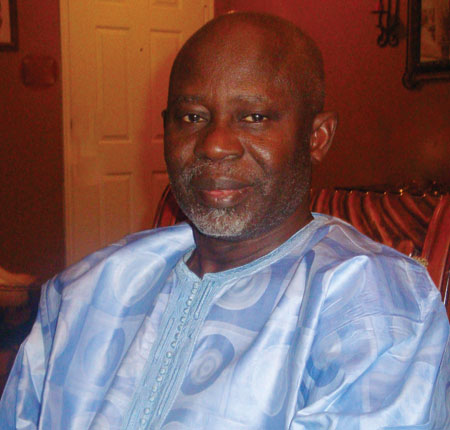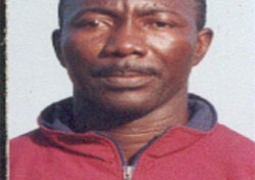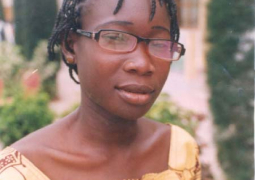
Counsel Bensouda was moving a motion for a stay of proceedings in the case involving Lawyer Ousainou Darboe and nineteen others, before the Banjul High Court presided over by Justice E.O. Dada.
When the case was announced, DPP S.H. Barkun with a team of state lawyers appeared for the state, while the defence team was led by Senior Counsel Antouman Gaye.
Senior Counsel Gaye then said: “We have filed a motion, and we have been served with an affidavit of opposition and we are ready to move our motion.”
The DPP said: “The motion was filed, but no date was given for the hearing. Subject to the convenience of the court we are ready to proceed with PW1.”
Counsel Gaye said: “It is our submission that the motion be dealt with first with your lord’s permission; I would like to call upon lawyer Bensouda to move the motion.”
The DPP argued that the motion they have been served with had no date and no date had been fixed for the hearing, and that being the case he was urging the court to proceed with the hearing of the substantive matter.
“I am surprised by the direction taken by DPP. The motion that we have filed is not an ordinary motion. It is unfortunate that the DPP’s motion was not dated. We are asking the court to stay its proceedings on certain counts of this matter.
“The reason is that we have filed a suit pending before the Supreme Court which is more superior to this court,” counsel Bensouda said.
Delivering her ruling, the trial judge said the record of the court during the last sittings showed that the matter was set for hearing.
She said the defence filed a motion, and the DPP replied by filing an affidavit in opposition.
She said the main reason of the DPP’s objection was that the motion was not dated, and the case was adjourned for hearing of the substantive matter.
She said the motion was properly laid before the court and, therefore, the DPP’s objection was overruled and the defence was allowed to move the motion.
In moving the application, senior counsel Bensouda said the applicants sought a stay of proceedings on counts 1 to 6, which was sworn to by the 1st accused, Ousainou Darboe.
She said the motion was supported by an affidavit and exhibits attached, adding that they relied on the said exhibits.
She said the motion was filed under the inherent jurisdiction of the court, adding that they relied on all paragraphs, but would draw the court’s attention to paragraph 3; that the accused had been standing trial before the court on an amended charge filed on 28 April 2016.
They placed before the court the constitutionality of counts 5 and 6, she said, adding that the applicants sought the jurisdiction of the Supreme Court to determine the constitutionality of counts 5 and 6.
Counsel Bensouda further said the suit filed at the Supreme Court had been exhibited to the motion.
She said it is for the Supreme Court to declare the counts null and void because “they are inconsistent” with the constitution.
“I submit that it is only the Supreme Court that can declare laws null and void,” she said.
She asked whether the court could proceed to try the accused persons on the same counts they were seeking to strike out.
She said the answer was that it could not be, because the Supreme Court is the highest court in the country, and its decision is final and binding upon the court and it could not be questioned.
“It is my submission that if not granted the ascended provision of the Supreme Court will be undermined, and made redundant because the trial will be taken place and there are counts that are challenged.”
Counsel Bensouda said the DPP, in his affidavit in opposition, said the parties in the suit at the Supreme Court “are not the same as the ones in the case at hand.”
“Our submission is that there is no distinction between the state as a party and the public officers within the state. The suit in the Supreme Court is constituted as a civil suit and not a criminal suit,” counsel Bensouda said.
“Your lordship will see that the Attorney General [the AG] is the 3rd defendant, the IGP the 1stdefendant and Director of NIA the 2nd defendant. The AG is seen as the representative of the state representing the public officers,” she added.
She said that for the DPP to say that the parties “are different” was “misconceived”, adding that the DPP in paragraph 3F of the affidavit in opposition said the suit before the Supreme Court “does not raise any substantive law requiring interpretation.”
The counsel further stated that the case invoked The Gambia’s international obligation, particularly the African Charter on Human and People’s Rights and other international laws.
“This is an application that seeks to enforce the constitutional rights of Gambians. The accused are in custody and not on bail. For them to seek for stay of proceedings so that they have a trial at the Supreme Court shows the magnitude that they are willing to suffer to make sure that their fundamental human rights can be protected. A stay of proceedings does not prejudice the state at all,” she said.
Counsel Bensouda also said: “It will not be in the interest of justice if stay of proceedings is not granted. The primary duty of this court is to ensure that the jurisdiction of the Supreme Court be invoked.”
Read Other Articles In Article (Archive)
Jallow misses golden opportunities in Brondby draw
Mar 2, 2011, 1:49 PM



